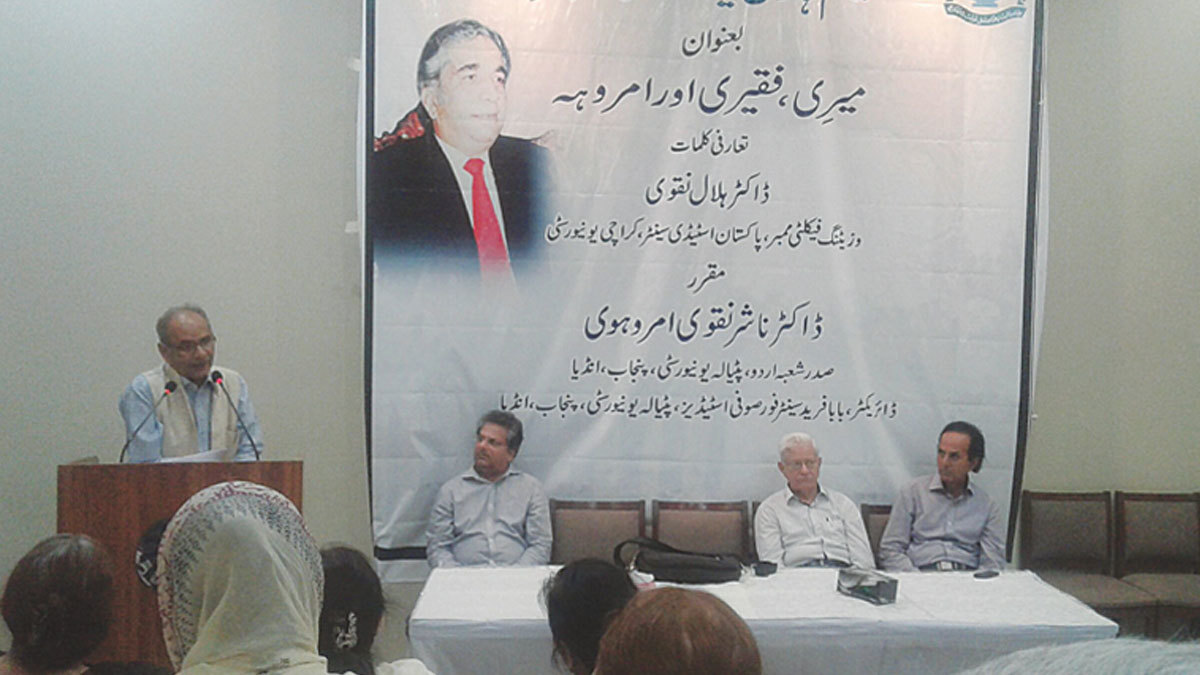Urdu got its name from the poet Mushafi, says scholar
If the Delhi School of Urdu is proud of Mir Taqi Mir’s poetry, Amroha is proud of the fact that Mushafi gave Urdu its name. This was claimed by Dr Nashir Naqvi Amrohvi while delivering the Shamim Hadi Memorial lecture on the topic of ‘Miri, Faqiri aur Amroha’ at Shah Wilayat School on Monday evening.
Dr Naqvi, who is head of the Department of Urdu and Director of the Baba Farid Centre for Sufi Studies at the Punjabi University Patiala in India, opened his lecture by expressing his fondness for the city of Amroha in spiritual terms.
Dr Naqvi said ostensibly Amroha was a small city but over the course of centuries the subcontinent’s history had unfolded before it. He said there were different theories regarding its name, one of which was to do with the fact that it’s a town where aam (mangoes) and rahu fish were found in abundance, hence Amroha. But, he said, the most likely thing was that the name was given to the city by Syed Husain Sharfuddin Shah Wilayat. He said Shah Wilayat had come to India with his father, Miran Syed Ali Buzurg Husaini Wasti, to preach Islam. He said Miran came to Amroha from Multan.

Dr Naqvi said even today the Naqvis of Amroha were the descendents of Shah Wilayat, and they comprised both Shias and Sunnis. Every year on Rajab 21 they celebrated Shah’s urs with great respect. He said according to the 2011 government stats, Amroha (now) had a population of 500,000, of whom 45 per cent were Muslims and the rest were from other religious communities (Hindus, Sikhs, Christians). He said the kind of love and devotion that the city had for Imam Husain had given its azadari (mourning) and rawadari (leniency or care) global recognition. Describing the spiritual prowess of Hazrat Shah Wilayat, he said dangerous insects lost their instinct (to bite) when they were around his aastana (shrine).
Dr Naqvi said another distinct identity of Amroha was its language, but quickly added that globalisation had affected its distinctness. In that context he gave many beautiful examples of words that were once spoken on a regular basis. The audience enjoyed them very much. He claimed if the Delhi School was proud of Mir Taqi Mir’s poetry and his Urdu, Amroha was proud that Mir’s teacher was Saadat Amrohvi. He said Amroha was also proud of the fact that it was Mushafi Amrohvi who gave Urdu its name in 1780. He said Amroha never claimed that it too developed into a school (of Urdu). He said due to limited employment opportunities there, Amrohvis went out of their city but never left it completely. He said wherever the people of Amroha stepped out, they kept their city close to their chests making organisations like the Sadaat-i-Amroha in different parts of the world. In other words, he said, to date Amroha was the cradle of culture and literature, and respecting the elders was part of their education. This reminded him of Mr Shamim Hadi, who he said was Amroha unto himself, and his book Khamosh Yaadein.
Dr Naqvi then expanded on another aspect of Amroha’s identity: azadari. He gave a detailed account of when it started to happen in the region. In between he provided the audience with some interesting bits of information. For example, he said, on Yaum-i-Ashur in present-day Chandigarh, non-Muslims did the zanjeer ka matam.
In the last part of his lecture, Dr Naqvi gave a list of those Amrohvis who achieved great feats in their respective fields. They included Mushafi, Mir’s teacher Saadat, Raees Amrohvi, Jaun Elia, Zubair Rizvi (poets), Mohammad Taqi, Ali Siddiqui, Nisar Ahmed Farooqui (critics), Sadequain, Iqbal Mehdi (painters), Kamal Amrohvi (filmmaker), Syed Mohammad (hakeem) and Shamim Hadi (philanthropist), among others.
After the talk, the floor was opened for questions and answers. Answering a question and underlining the spiritual nature of the city of Amroha, Dr Naqvi said there had never been Shia-Sunni tensions in Amroha. He said Sunnis took part in Shia processions in Muharram.
Earlier Hilal Naqvi introduced the speaker to the audience. Syed Mohammad Sibtain delivered the vote of thanks, and Mumtaz Hadi conducted the event.
Originally Published in Dawn, July 5th, 2016














Comments